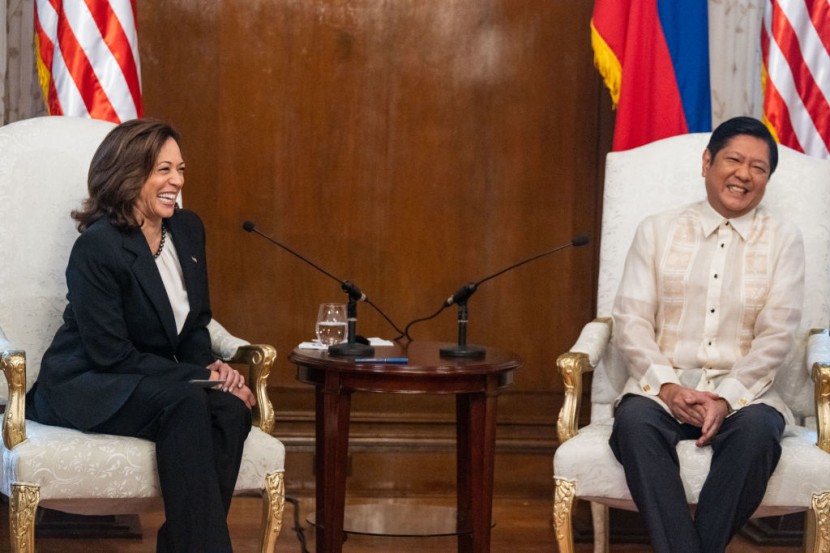
United States Vice President Kamala Harris vowed on Monday that Washington would defend the Philippines if it is attacked in the South China Sea, reiterating America's "unwavering" commitment to its Indo-Pacific ally.
Harris, in an interview with reporters on Monday, reaffirmed Washington's "unwavering" commitment to the agreement with its oldest treaty partner and former colony, according to Reuters.
Harris said that any attack on Philippine ships in the South China Sea would activate US defense obligations. She made the statements after her first meeting with Philippine President Ferdinand Marcos Jr.
Pres. Marcos said the "upheavals" in the region only highlighted the importance of the already solid relationship between the two countries.
"I do not see a future for the Philippines that does not include the United States," President Marcos said, the son of the late dictator ousted during the 1986 "People Power" revolution, whom Washington helped flee into exile in Hawaii.
US Vice Pres. Kamala Harris' trip is primarily viewed as Washington's attempt to reestablish ties with Manila, a key Asian ally, in US efforts to challenge China's more aggressive initiatives against Taiwan.
Kamala Harris noted, "We stand with you in defense of international rules and norms as it relates to the South China Sea."
VP Harris To Visit Philippine Province Near Disputed South China Sea Area
On Tuesday, Harris will also visit Puerto Princesa, Palawan to show that the United States administration will stand with the Philippines to safeguard the South China Sea's rules-based international maritime arrangement, according to the Philippine News Agency.
She will make a speech highlighting the value of upholding international law, unhindered trade, and freedom of navigation in the South China Sea.
Additionally, she will meet with locals, civil society leaders, and Philippine Coast Guard members.
Puerto Princesa on the island of Palawan is the headquarters of the Philippine military command tasked with protecting and patrolling Philippine seas around the Spratly Islands, aside from the island's more well-known reputation as a tourism spot for its scuba diving activities.
China claims almost the entire 1.3 million sq. km. waterway as its own based on its understanding of historical maps, including the southern portion, which includes the Spratly Islands.
The Asia Maritime Transparency Initiative claims that the Philippines currently governs nine of the features in the Spratly chain, while China controls seven.
However, Beijing has strengthened and reinforced much of its assertions in the chain, including the construction of military bases on Subi Reef, Johnson Reef, Mischief Reef, and Fiery Cross Reef, which it refers to as the "Nanshas."
One Philippine-controlled feature, Thitu Reef, is the only one that even has a runway.
Vietnam, Taiwan, Brunei, and Malaysia are just a few of the nearby countries that also claim territory in the resource-rich waterway.
Chinese claims to historic rights in the South China Sea were rejected by a tribunal in The Hague in 2016, ruling in favor of the Philippines.
US Sending A Stern Message
Maritime security expert Gregory Poling from the Center for Strategic and International Studies in Washington DC said that the United States and the Philippines have moved past the stormy period they experienced.
Poling remarked that Kamala Harris' visit sends a strong message of support to the Philippines without threatening Beijing since she will visit Palawan, which is near the South China Sea but not a contested island, as per CNN.
He argued that the advantage to the United States and the Philippines of sending a message of standing in unity in the South China Sea would overshadow any minor frustration it might cause in Beijing.
According to Jose Manuel Romualdez, the ambassador of the Philippines to the United States, Harris's visit to Palawan demonstrates how strongly America backs an ally and how concerned it is with China's activities in the disputed sea.
The Philippine envoy noted that Kamala Harris' visit shows how seriously the US takes the situation in the region, as it sends a message to China that it supports its allies "like the Philippines on these disputed islands," PBS reported.
Related Article : Southeast Asian Leaders Pledge Not To Let the US Manipulate ASEAN in Cold War Versus China
© 2026 HNGN, All rights reserved. Do not reproduce without permission.








